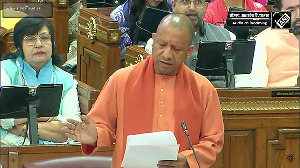Beijing on Wednesday marks the 100-day countdown to the Olympics with songs, a mass run and even prayers, hoping to put behind it the tumultuous events of the past month which have taken much gloss off its preparations.
Unlike run-ups to recent Olympics, Beijing's preparations for August have kept to plan, and some stadiums and infrastructure have even been completed ahead of schedule. All is now ready to go.
In all, the city has spent $35-40 billion on improved infrastructure, including a new airport terminal and subway lines, as well as $2.1 billion to cover the cost of running the Games.
But the city's smooth preparations for the Olympics have been overshadowed 100 days out by the torch relay's troubled journey around the globe, with protesters targeting China's human rights record, in particular its policy on Tibet.
One of the highlights of Wednesday's festivities will be a run around the Olympic Green by 10,000 Beijing residents, part of China's promise to make the Games a "People's Olympics".
There will also be songs celebrating the Games.
And in officially atheist China, Catholic churches throughout the country will hold masses to pray "for a successful Games", according to the official Xinhua news agency.
The city will be desperate to prevent a repeat of the one-year countdown, when Free Tibet activists scaled the Great Wall, smog smothered Beijing and torrential rain brought parts of the capital to a standstill.
Security in Beijing has been noticeably stepped-up in recent weeks following anti-Chinese protests in Tibet and during the torch relay, and China's assertion that it has broken up terrorist plots to attack the Games.
MEDIA CONCERNS
Beijing's promise to ensure complete media freedom has also been called into question, especially following Chinese criticism of foreign reporters for perceived bias in their coverage of the protests in Tibet in March.
"If allowed to continue, the reporting interference and hate campaigns targeting international media may poison the pre-Games atmosphere for foreign journalists," Foreign Correspondents Club of China President Melinda Liu said in a statement.
"We urge government authorities to investigate the death threats, which violate Chinese law, and otherwise help create an environment in keeping with their Olympic promises," she added.
Chinese Foreign Ministry spokesman Liu Jianchao defended the reporting environment, though admitted that not every official understood new rules introduced for the Olympics permitting the foreign press greater freedom.
"It is true that some people have had a better understanding of the regulations while others have lagged behind. In general it has been good," he said.
China has lashed out at human rights groups and some European and U.S. politicians who have, in China's words, tried to politicise the Games, and raised the prospect of an Olympic boycott in light of the crackdown on protests in Tibet.
Earlier this week, 100 Chinese athletes and 2,000 Olympic volunteers made a public pledge to keep the event "pure" and uncorrupted by politics.
"We hope that the Olympics puts politics aside, and returns to the true characteristics of sport," Communist Party mouthpiece newspaper the Guangming Daily quoted Olympic gymnastics gold medallist Li Ning as saying.
Olympics chiefs have praised the city's preparations, and its showpiece stadiums the Bird's Nest and Water Cube have drawn wide acclaim.








 © 2025
© 2025